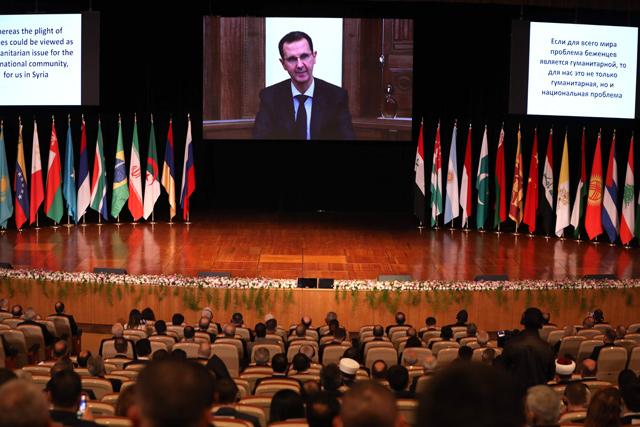- International News
- Thu-2020-11-12 | 06:52 pm

Nayrouz News Agency :
Syria's government kicked off a two-day Russia-backed conference in Damascus on Wednesday towards facilitating the return of millions of Syrian refugees to the war-torn country, despite reservations within the international community.
Of neighbouring countries hosting the bulk of Syrian refugees, only Lebanon and Iraq sent representatives, according to organisers.
Other attendees included a Russian delegation and representatives of Syrian government allies Iran, Venezuela and China, while a United Nations representative was expected to attend as an observer.
Syrian President Bashar Assad a televised speech said "millions of Syrians want to return”.
But a huge amount of "infrastructure has been destroyed after being built over decades, and terrorism continues in some areas” he said, using his blanket term for rebels .
Assad said Western sanctions targeting the Damascus government were also "depriving the country of the simplest means for reconstruction”.
Since Syria’s conflict started in 2011, more than half of its pre-war population has been forced to flee their homes, including 5.5 million who went abroad.
Neighbouring Turkey hosts the highest number of Syrian refugees, followed by Lebanon and Jordan.
The European Union said Tuesday it would also not attend, as the situation in Syria was not yet safe for returns.
EU foreign policy chief Josep Borrell said Syria’s priority must be "to create conditions for safe, voluntary, dignified and sustainable return of refugees” in line with guidance from the UN refugee agency.
After a series of military victories in recent years, Assad’s forces control more than 70 per cent of Syria, while remaining areas are held by US-backed Kurdish forces and rebels.
Russia, a main ally of the Damascus government, has for years sought to garner international support to reconstruct Syria and allow for refugee returns.
But rights groups have warned that many areas lack the necessary infrastructure or remain unsafe.
Western nations led by the United States have conditioned their help on a political settlement to the conflict













